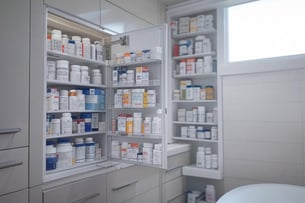Top 10 Pharmacy Tips for Managing Your Medications Safely
Pharmacies are more than just places to pick up prescriptions—they’re hubs of health expertise where pharmacists help you navigate the complex world of medications. With over 823,000 monthly Google searches for “pharmacy” in the UK alone, people are actively seeking advice on managing their medications safely and effectively. Whether you’re juggling multiple prescriptions or just starting a new medication, these practical tips from pharmacists will help you stay organized, avoid mistakes, and get the most out of your treatment. Let’s explore 10 essential pharmacy tips to keep your health on track.
PHARMACYHEALTH
4/2/20254 min read


Why Medication Management Matters
Medications can be lifesaving, but mismanagement can lead to serious issues. According to the World Health Organization, about 50% of patients worldwide don’t take their medications as prescribed, leading to worsened health outcomes and increased healthcare costs. Pharmacists, as trusted healthcare professionals, play a critical role in guiding patients to use medications correctly. From understanding prescription labels to avoiding drug interactions, these tips will empower you to take control of your medication routine.
Top 10 Pharmacy Tips for Safe Medication Management
How to Learn More
Want to deepen your knowledge?
- Visit Your Pharmacist: They’re your go-to for free, expert advice.
- Read Trusted Blogs: Sites like PharmaTimes or The Pharmaceutical Journal offer reliable health tips.
- Take a Course: Online platforms like Coursera offer medication safety workshops.
- Follow on Social Media: Pharmacists on X often share quick tips
Conclusion
Managing medications safely doesn’t have to be overwhelming. By understanding your prescriptions, staying organized, and leaning on your pharmacist’s expertise, you can ensure your treatments work as intended. These 10 tips are your roadmap to better health, backed by the knowledge of pharmacists who are dedicated to your well-being. Share this post with someone who could benefit, and let’s make medication safety a priority together!
Call to Action: What’s your top tip for managing medications? Drop it in the comments below or ask a question you’d love a pharmacist to answer! Visit your local pharmacy or check out PharmaTimes for more health insights.
Building a Home Medicine Cabinet
A well-stocked medicine cabinet is a must. Here are essentials recommended by pharmacists:
- Pain relievers: Acetaminophen or ibuprofen.
- Antihistamines: For allergies or colds.
- Bandages and antiseptic: For minor cuts.
- Thermometer: To monitor fevers.
- Antifungal cream: For skin issues like athlete’s foot.
Tip: Ask your pharmacist to review your cabinet annually to ensure everything is up-to-date.
1. Understand Your Prescription Label
Prescription labels can be confusing, but they contain vital information. Key details include the medication name, dosage, frequency, and special instructions (e.g., “take with food”). If anything is unclear, ask your pharmacist to explain. A 2024 study in the Journal of Pharmacy Health Services Research found that clear pharmacist counseling improves adherence by 30%. Tip: Keep the label intact and store medications in their original containers to avoid mix-ups.
2. Create a Medication Schedule
Juggling multiple medications? Use a pill organizer or set reminders on your phone. Apps like Medisafe or MyTherapy can send alerts for doses and refills. Pro Tip: Write down your schedule and share it with a family member or caregiver for extra accountability. This is especially helpful for chronic conditions like diabetes, which affects millions globally and requires strict adherence.
3. Know Potential Side Effects
Every medication has possible side effects, from mild (e.g., drowsiness) to severe (e.g., allergic reactions). Ask your pharmacist about what to expect and when to seek help. For example, the Pharmaceutical Journal notes that pharmacists often counsel on early signs of adverse reactions, like rashes or shortness of breath. Action: Check resources like the National Library of Medicine’s Drug Information Portal for detailed side effect lists.
4. Avoid Dangerous Drug Interactions
Some medications, foods, or supplements can interact harmfully. For instance, drinking alcohol with certain antibiotics or painkillers can reduce effectiveness or cause toxicity. Pharmacist Advice: Always tell your pharmacist about all medications, over-the-counter (OTC) drugs, and supplements you’re taking. They can use tools like drug interaction tables to spot risks.
5. Don’t Skip Doses or Stop Early
Skipping doses or stopping a medication prematurely—especially antibiotics—can lead to treatment failure or resistance. A 2023 study in International Journal of Pharmacy Practice highlighted that pharmacist-led interventions improve adherence by addressing patient concerns. Tip: If you’re struggling with side effects or costs, talk to your pharmacist about alternatives instead of stopping on your own.
6. Check Expiration Dates
Expired medications may lose potency or become unsafe. Pharmaceutical manufacturers determine expiration dates through stability testing, and most drugs are less effective past this point. How to Check: Look for the expiration date on the bottle or box. Safely dispose of expired drugs at a pharmacy take-back program to avoid misuse or environmental harm.
7. Use OTC Medications Wisely
OTC drugs like acetaminophen or antihistamines are convenient but not risk-free. Overuse can lead to liver damage or drowsiness. Pharmacist Tip: Ask about the right OTC product for your symptoms. For example, pharmacists can recommend specific creams for eczema or safe cold remedies for kids. Always follow dosage instructions.
8. Take Advantage of Pharmacy Services
Modern pharmacies offer more than prescriptions. Many provide flu shots, travel vaccines, or medication reviews. For instance, ear wax removal services have surged in popularity, with 90,500 monthly UK searches. Explore: Ask about services like prescription refill reminders or pharmacist-led health checks to simplify your care.
9. Store Medications Properly
Improper storage can degrade medications. Most should be kept in a cool, dry place away from heat or humidity—avoid bathroom cabinets! Some drugs, like insulin, require refrigeration. Quick Tip: Check storage instructions on the label or ask your pharmacist. Keep medications out of reach of children or pets.
10. Build a Relationship with Your Pharmacist
Pharmacists are accessible healthcare experts who can answer questions, clarify doubts, and offer personalized advice. A 2024 International Journal of Pharmacy Practice study found that patients with strong pharmacist relationships report higher satisfaction and better health outcomes. Action: Visit the same pharmacy consistently and don’t hesitate to ask about anything from new medications to lifestyle tips.
Bonus: Busting Medication Myths
- Myth: It’s fine to share prescriptions with family.
Truth: Medications are prescribed for specific conditions and dosages. Sharing can be dangerous and is illegal.
- Myth: Natural supplements are always safe.
Truth: Supplements can interact with medications. Always consult your pharmacist.
- Myth: You can cut all pills to save money.
Truth: Some medications (e.g., extended-release) shouldn’t be split. Check with your pharmacist first.


About
Copyright © 2024 Clientverdict Inc. All rights reserved. Clientverdict, Clientverdict logo and related marks are registered trademarks of Clientverdict.

Discover
Clientverdict for Business
About Clientverdict
Careers
Press
Clientverdict Project Cost Guides
Trust & Safety
Content Guidelines
Investor relations
Your Privacy Choices
Privacy Policy
Terms of service
Accessibility Statement
Ad Choices
Collections
Talk
Events
Clientverdict Blog
Support
Clientverdict Mobile
Developers
RSS
Contact:
Languages:
Clientverdict for Business
Business Owner Login
Claim your Business Page
Why We Trust ApriaDirect
Clientverdict for Restaurant Owners
Table Management
Business Success Stories
Business Support
Clientverdict Blog for Business
Collections
Clientverdict Data for B2C
English
818 - 861- 9004
